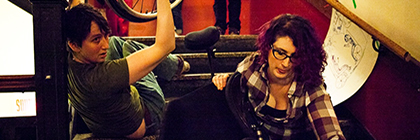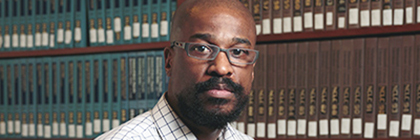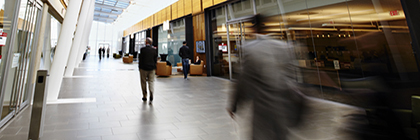A talk and workshop on research-creation work within the field of disability arts will be the focus of the next instalment of the Performance Studies (Canada) Speaker Series presented by the Graduate Program in Theatre & Performance Studies at York University and the Performance Studies (Canada) Project.
In the 2016-17 series, all events have been organized around the theme of “Access/Excess: Choreographies of Difference.” These events are part of the Department of Theatre’s year-long exploration of disability and performance. Inspired by conversations at the local and national levels, our goal is to work closely with members of the disability arts community to challenge traditionally “ableist” modes of making theatre and to “crip” our studios, classrooms and stages.
The upcoming events feature Lindsay Eales, a PhD candidate in the Faculty of Physical Education & Recreation at the University of Alberta, who studies disability, madness and dance; and Danielle Peers, an assistant professor in the Faculty of Physical Education & Recreation at the University of Alberta, who studies the barriers to, dangers of, and opportunities for flourishing through disability movement practices and communities – including parasport, inclusive recreation and dance.

Event details include:
Lecture: Lindsay Eales and Danielle Peers, “Maddening Research, Cripping Creation”
When: Thursday March 9, 10 to 11:30am
Where: Room 209, Accolade East Building, York University
Description: It’s all in my pretty little head. Imaginary. Like an invisible friend. Or intelligence. Or an aneurysm. I take my pills, like a good girl. Greyness lifts and numbness sets in. My throat swells. There once was a woman who swallowed a fly. I don’t know why she swallowed the fly. Perhaps she’ll die.
What could be more natural than breath: the delimiting marker of life and death? We are moved through inspiration and stilled in expiration. We are taught to breath organically: lungs and diaphragms; projected voice; projected independence.
As the breath slows, falters, it leans upon new muscles and bones, machines and bodies, theories and possibilities. Illness. The generativity of shifting needs.
An ex-Paralympian-turned-sick filmmaker and a Mad-biped-choreographer entwine in movement and thought. We offer (dis)jointed research-creation musings: weaving theory, spoken word, dance, and film, then pulling at the seams. We explore care-sharing, community-based knowledge generation, c(r)amp aesthetics, maddening research, and cripping creation.
This event is free and open to the public. ASL interpretation will be provided.
This lecture is also presented as the keynote event in the AMPD Grad Research-Creation Salon, “What is Practice Research?,” running from 10am to 2:30pm. It is a public research salon that brings together graduate students and postdoctoral researchers to share the methods they are using in their practice-based research. It will include a research-creation roundtable, a catered reception and an AMPD research-creation speed dating event. For more information about this event, email performancestudiescanada@gmail.com.
Performance Workshop: Lindsay Eales and Danielle Peers, “Moving with Crip and Mad Community”
When: Friday March 10, 11:30am to 1:30pm
Where: Room 209, Accolade East Building, York University

Description: This workshop will use dance and creative movement to explore the generative possibilities of crip and Mad movements and relationships. We will work together to establish what deep crip consent means when dancing together. We will engage in movement exercises that contrast adaptation of normative dance practices with transformative reimaginings of dance vocabularies. We then focus on generating unique dance vocabularies that emerge from, and honour, the bodies and movements in the room. We will explore the politics and possibilities of enabling, restricting, sharing and resisting movement in relation to others in the group. We will facilitate opportunities to create movement, both alone and together, based on these ideas. Those who wish to share their creations with the group will have the opportunity to do so. We will end by reflecting on how these movement tools might foster forms of crip and Mad community.
The performance workshop is open to students from across the University. As there will be a limited number of spaces, email to Professor Laura Levin at gpdtaps@yorku.ca to sign up for the workshop. ASL interpretation will be provided.
Lindsay Eales is a PhD candidate in the Faculty of Physical Education & Recreation at the University of Alberta who studies disability, madness and dance. She is also the co-artistic director of CRIPSiE (the Collaborative Radically Integrated Performers Society in Edmonton), which enters dance by and for people experiencing disability as well as their artistic and political allies. She has choreographed and performed integrated dance for 10 years. Eales’s artistic work has been a part of numerous performance festivals, including the Alberta Dance Alliance’s FEATS Festival, Kaleido Festival, Orchesis Dance Motif, Nextfest, The Works Art & Design Festival, Stage Left’s production of Women’s Work, MoMo Mixed Ability Dance Theatre’s Body Language, and the Exposure Queer Arts Festival. Her master’s research focused on practices and performances of social justice in integrated dance. Her work has been published in journals such as Adapted Physical Activity Quarterly, Leisure/Loisir: The Journal of the Canadian Association for Leisure Studies, and Emotion, Space and Society. For her research-creation work weaving together critical disability studies, Mad studies and dance, she has been awarded the Vanier Canada Graduate Scholarship (SSHRC), the Alberta Arts Graduate Scholarship, and the Alberta Award for the Study of Human Rights & Multiculturalism.
Danielle Peers is an assistant professor in the Faculty of Physical Education & Recreation at the University of Alberta. Peers studies the barriers to, dangers of, and opportunities for flourishing through disability movement practices and communities – including parasport, inclusive recreation and dance. They recently completed a Banting Postdoctoral Fellowship (SSHRC) at the University of Concordia, focusing on emerging digital and research-creation methods for studying disability movement(s). In their PhD studies, they were awarded both the Vanier-Canada Graduate Scholarship (SSHRC) and the Trudeau Foundation Scholarship. Their research builds off of their personal experiences as an activist, filmmaker, emerging dancer, former Paralympian and parasport coach. They translate their research through policy creation and public speaking, including recent invited talks for the Department of Indigenous & Northern Affairs, the Canadian Paralympic Committee and the United Nations.
The events are sponsored by: Performance Studies (Canada) Speaker Series; York’s graduate programs in Theatre & Performance Studies, Theatre, Visual Arts, Art History & Visual Culture, Cinema & Media Studies, Film, Music, Dance Studies, Dance and Design; York’s Department of Theatre and Department of Visual Art & Art History; Office of the Vice-Provost Academic; dean of the School of the Arts, Media, Performance & Design; dean of the Faculty of Graduate Studies; Centre for Research on Latin America & the Caribbean; Canada 150 @ York; Disability Law Intensive Program (Osgoode); and Canadian Consortium for Performance and Politics in the Americas.








 Canada will celebrate the 150th anniversary of Confederation in 2017. “Visions, Collaborations and Transformations” will focus on the Canada150 themes identified by the Government of Canada: the environment, diversity and inclusion, Indigenous people, and youth.
Canada will celebrate the 150th anniversary of Confederation in 2017. “Visions, Collaborations and Transformations” will focus on the Canada150 themes identified by the Government of Canada: the environment, diversity and inclusion, Indigenous people, and youth.






